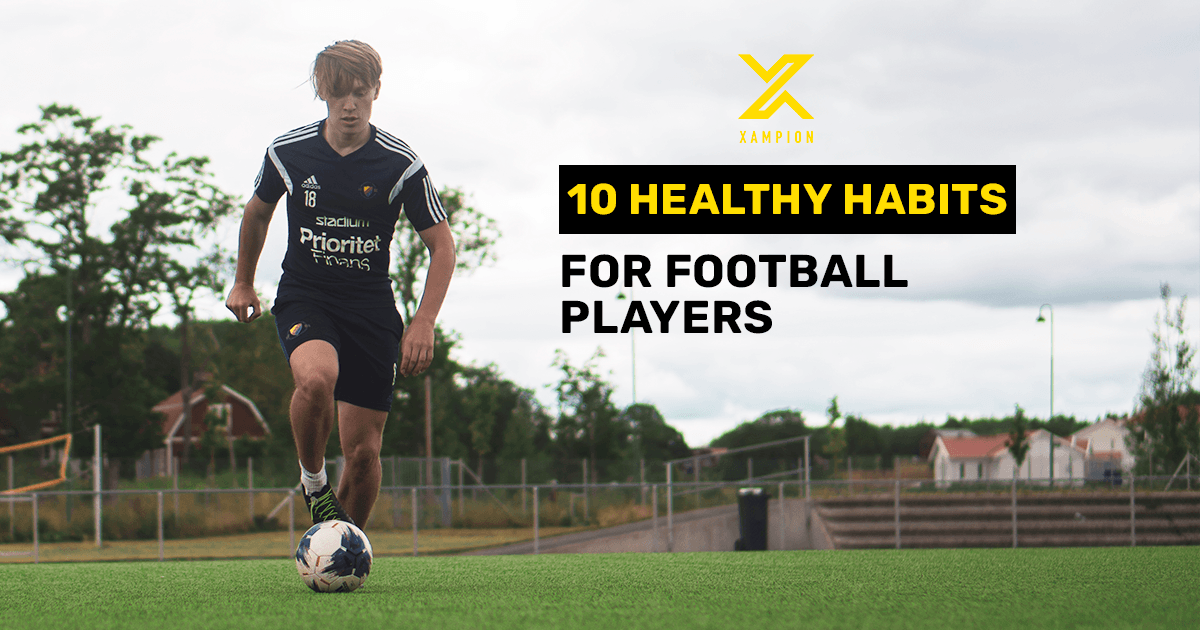
Habits are the invisible architecture of our lives. 40% of what we do is shaped by our habits. If we have the right habits, we will do better in all aspects of life, but if we don’t, then we are making our paths to success much harder. That’s why today we are going over 10 healthy habits of football player that will allow you to overcome your football obstacles if you implement them into your life.
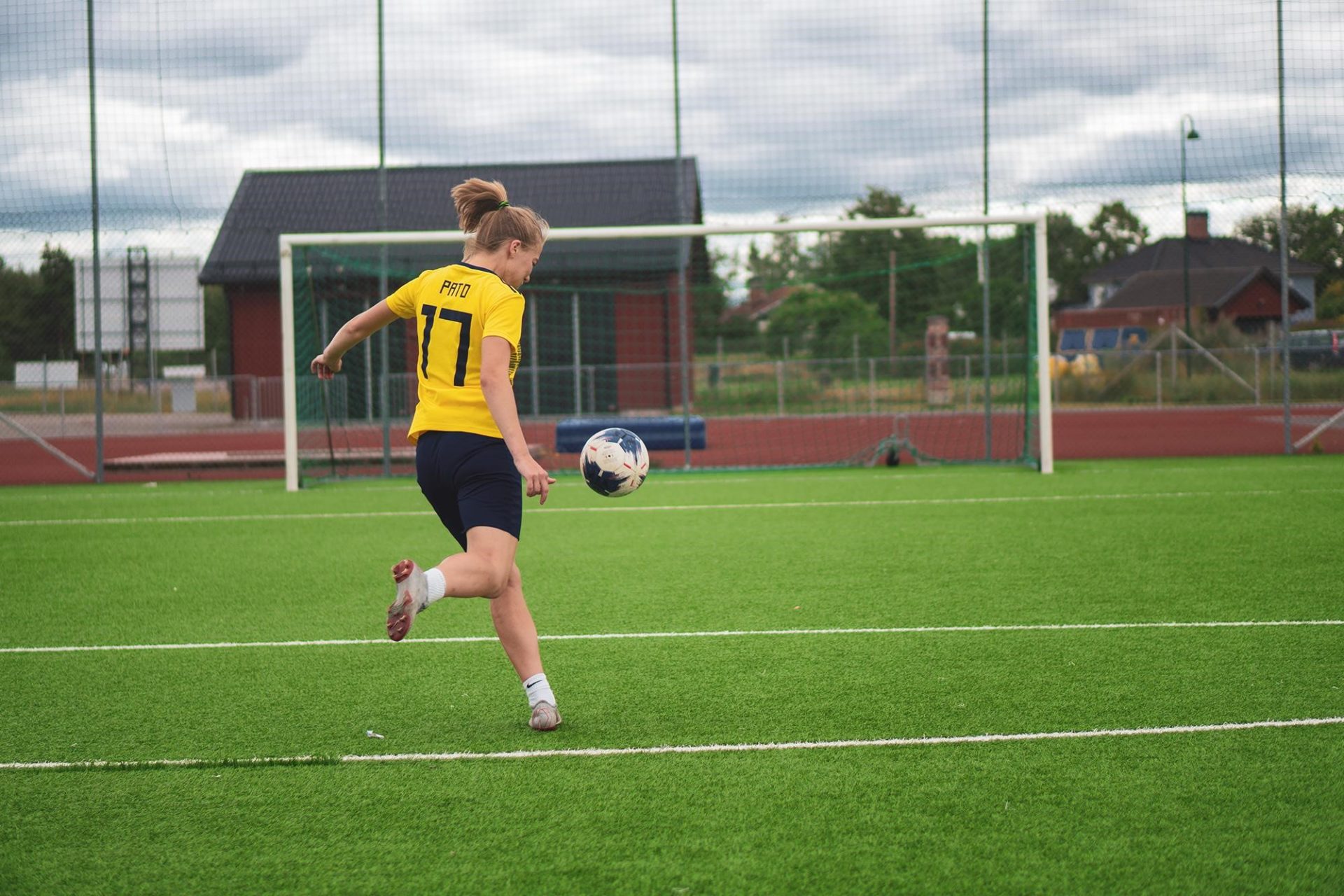
1. Football Players with Healthy Habits Know They Will Fail a Lot
“Ever tried. Ever failed. No Matter. Try Again. Fail again. Fail better.” – Samuel Beckett
We live in a rushed society. We want everything to work and happen right away and aren’t patient enough.
Studies clearly show that the biggest fear of young players is shame and embarrassment, which is caused by failure.
Regardless of how much you practice in a day, it’s not going to be enough for you to succeed in one day, at whatever you are trying to do. Your body won’t build a habit of kicking the ball a certain way in one day, even with hundreds of repetitions. And even when you learn something at the training grounds, you aren’t always going to do it right on the football pitch, but guess what? Even the best don’t always succeed.
When you miss a shot, smile at yourself. When you fail going past the opponent, make your way back, and try again when you get a chance, knowing that you are able to go past the opponent.
If you get upset when you fail at a dribble, you are putting your mindset in the wrong direction and making it far more likely to fail again. That’s why eliminating the fear of failure is one of the most important healthy habits of football players.
2. They are Consistent
You need to try, fail, and then try again. But, you can’t just do it on one day. You need to do it consistently.
In motivational videos, you will hear about people training for hours per day. In reality, in most cases, that’s not a healthy habit of football players.
If you were to train for 8 hours in a day, your muscles would get too exhausted, preventing you from performing for the next few days, and increasing the likelihood of injuries that absolutely no player wants.
Instead of working out for 8 hours per day, workout anywhere between 1 hour up to 3 hours every day. That way, you won’t exhaust your muscles as much and will be seeing progress far quicker than if you just workout a lot in one day.
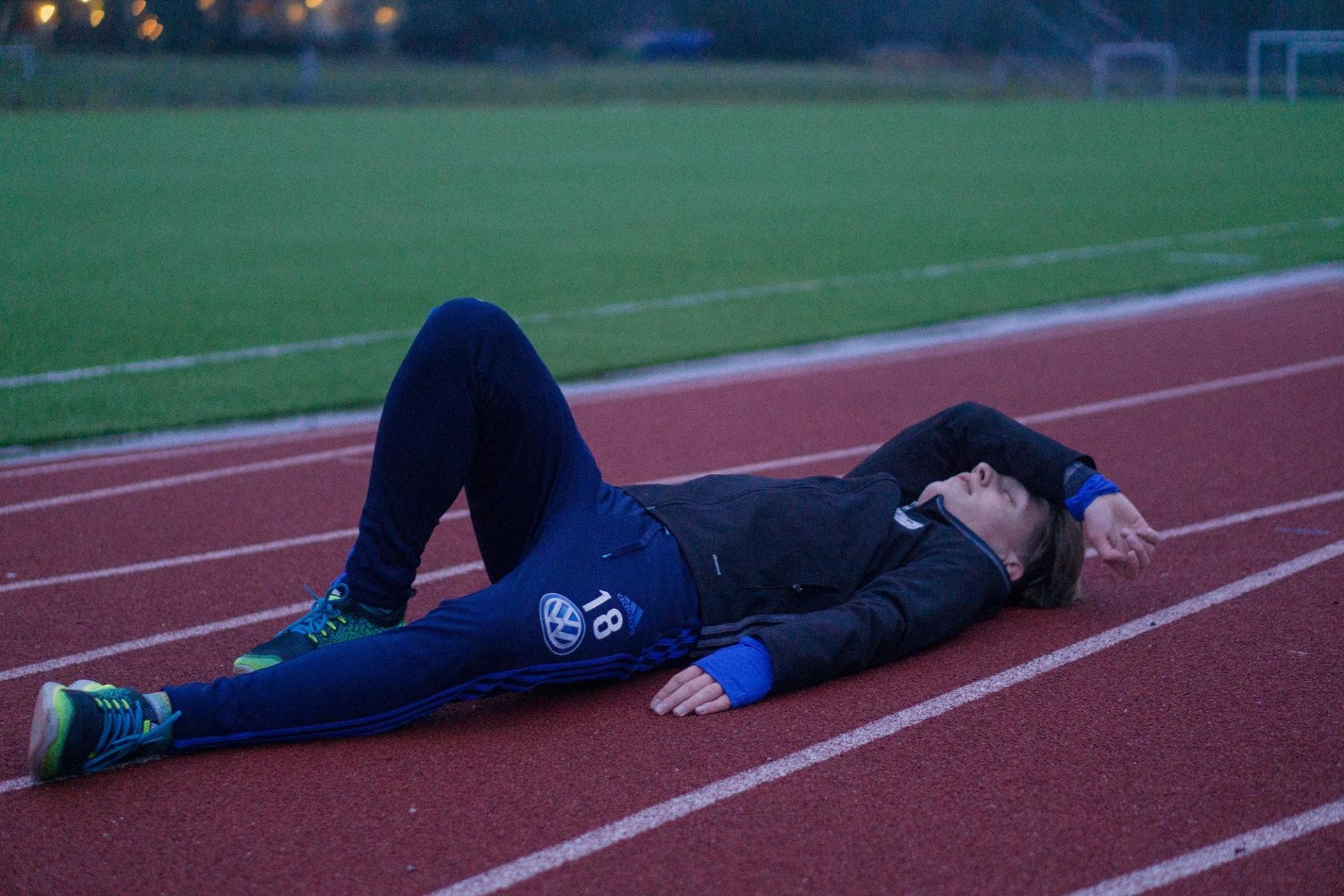
Players like Harry Kane agree that consistency is the key.
Of course, you don’t need to do every type of workout every day as that will still exhaust your muscles. Things like footwork and shooting, that you can work on every day, but things that exhaust your muscles such as workouts in the gym or intense sprinting sessions, do them, but also listen to your body and take a break on them if you feel like you need to.
On our blog, we cover topics that will help you improve as a football player whether you want to become a better Sunday league player or want to improve your weaker foot which is worth checking out if you are looking to make the most out of your workouts.
3. They Stretch and Warm-Up Well
This is one of the healthy habits of football players that young players often ignore.
Warming up and stretching well is the most underestimated pre-match and pre-training routine out there. It’s also one of the healthy habits of football players that if done wrong hurts players rather than helping them.
Before you stretch, you need to warm-up. There’s an overwhelming amount of research that shows that stretching before a warm-up hurts your muscles rather than helps them.
Proper stretching done with a right warm-up will allow your muscles to be more flexible while also putting less force on them, resulting in a lower risk of injury.
If you have warmed-up and stretched wrong in the past, you’ve been making life harder for your body, and have more likely made your muscles less flexible, which will take some time to fix.
But after a while of consistent daily warming-up and stretching, your muscles will be more flexible than ever, giving you a major advantage on a football field.
4.They Know There’s Always More to Learn
This is one of the healthy habits of football players that allowed players such as Ronaldo to maintain at such a high level at the age of 34.
Players such as Ronaldo, Messi, or Lewandowski are consistently ahead of other players because they are always learning and implementing new strategies and using new technologies to get ahead. Some would argue that the older they get, the better they look. It’s because they are always learning.
Want to improve your breathing during a game? Next time you run, breath only with your nose. It seems simple yet it’s those little things that can make such a big difference and can save you an incredible amount of time on conditioning.
The best way to learn about health techniques that can also be implemented in football? Podcasts. There’s plenty of podcasts around health, biohacking, and alternative health-based around little hacks that will get you just a little bit further every time you apply one.
Of course, knowing there’s more to learn isn’t just about that. One of the healthy habits of football players is to listen to the feedback of others. Not everyone is always going to be right, but more often than not, constructive criticism can help you improve as a football player.
5. They Sleep Right
We all love to sleep in the morning, but when we have a choice over watching Netflix or going to bed at the right time, in most cases, most of us will choose Netflix.
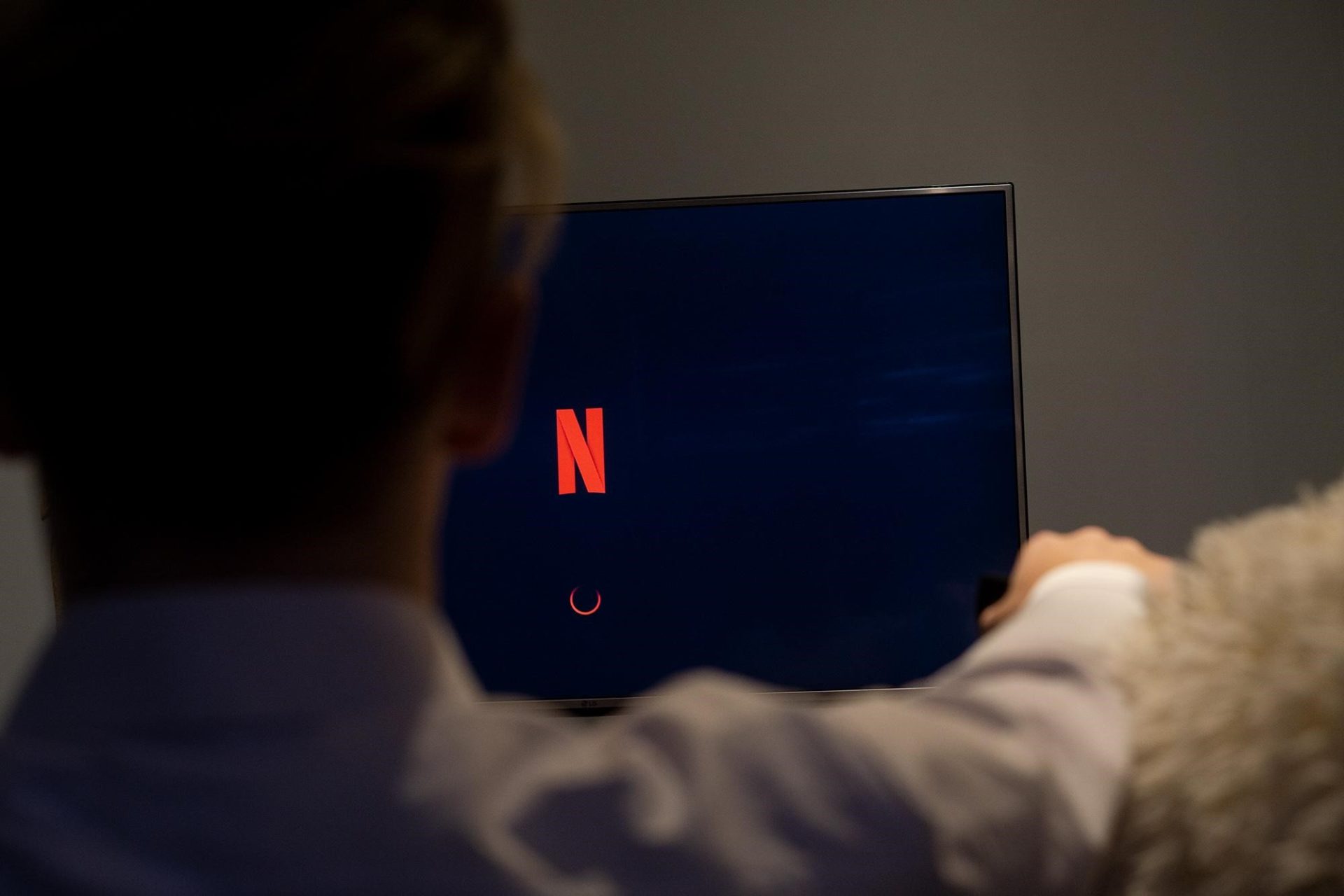
Athletes with poor quality of sleep have slower reaction times, worse physical performance, lower moods, and an increased risk of illness and injury.
That’s why sleep is so important.
And this especially applies if you are a teen and trying to become a professional football player considering that 97% of teenagers get less than the recommended amount of sleep.
Ronaldo goes to bed early and wakes up early aiming for a minimum of 8 hours. That allows his muscles to recover, which he says is very important for him.
Do you need 8 hours of sleep? If you are an athlete, you most likely do.
However, it’s not as simple as hours.
Quality of sleep matters more than quantity. Most of us lack deep sleep, which is the most beneficial part of sleep and the difference between feeling rested, or not.
Here’s what you can do to improve your sleep quality:
- Be consistent with your sleep. If you go to sleep at random times, your body will constantly be confused as to when you should be going to sleep. This is the biggest mistake people make when it comes to sleep. They go to sleep at random times.
- Block out blue light. Blue light, while beneficial during the day, is harmful to our sleep at night as we just naturally aren’t supposed to be affected by it at night. Unfortunately, devices with screens emit it, and as a result, our body doesn’t know when it’s time to sleep and when it’s not. Blue light blocking glasses eliminate artificial blue light coming from screens, allowing your body to know when it’s night, and when it’s not, meaning you will fall asleep faster, have better quality sleep, and wake up feeling better. Harvard has an article around blue light that dives into blue light a lot more if you’d like to know more.
- Control your room temperature. Room temperature is incredibly important when it comes to sleep quality and sleep overall. When you try to go to sleep, your brain tries to lower its temperature. If your room is too hot, it’s hard to achieve that. By lowering the temperature of your room to the range of around 15-16°C, you are making the task of sleep far easier. Of course, if you are too cold, make it higher, but the key is to have it when it’s cold, but not too cold.

The best way to know if your sleep is improving? By tracking it. A lot of trackers come with sleep tracking abilities, whether it’s the Oura Ring or something like a Fitbit. Oura rings are very rich as far as sleep data, and overall not too disturbing compared to a traditional tracker like a Fitbit, but not everyone wants to wear a tracker at night, and that’s where devices like the Withings Sleep Tracking Mat can come in as a solution that you just put on your bed.
6. They Take Care of Their Mindset
This is something that isn’t talked about in football enough yet. Everyone assumes that football players live these perfect lives, and that’s often not the case.
“I still get so pissed off, even when coaches from other teams comment about what I should be doing. What do they know? They aren’t there every day with players lacking confidence, going through divorces, with problems at home. There are a million things that can affect the performance of a player.” – Pep Guardiola
We all have issues, and those issues, they can reflect on the pitch.
Whether it’s personal issues, or something like fear of failure, or being scared of someone on your team.
One of the healthy habits of football players that you won’t often hear about is to work on your mindset.
What can you do?
- Meditate. Services like Headspace offer meditation programs specifically designed for athletes, as well as for many other issues. If you are struggling with motivation issues, anxiety, or any other mindset issues, Headspace most likely has a meditation for that. Meditation will clear your mind and allow you to focus on your match.
- Create a pre-match routine where you play a football motivational video and say to yourself that you can do it and that you deserve to be playing because you are great. It will build confidence before a game and a great way to get ready for a game.
- Go to a psychologist or talk with somebody. If you have confidence issues, meditation, and a right pre-match routine should help you. If it’s something bigger, it’s worth talking about it to someone or going directly to a psychologist.
Mental health in football is something that’s going to be talked about a lot in the near future, and that’s important because we live in a culture that doesn’t currently accept mental health issues in sports.
7. They Listen to Their Body
Great players adapt to conditions around them. If you feel like you overtrained a day prior, take it easier the next day. It will prevent long-term fatigue.
Sure, consistency is key, but you also need to listen to your body and relax.
Wesley Sneijder said that “You can’t play at your top-level every week if you’re always thinking about football.”

Play some mini-golf. Go bowling. Relax in a healthy way.
8. They Track What the Do
Have you ever wondered how it is that sometimes you feel on top of the world when you play, meanwhile other times, you feel like you want to get sick?
Whether it’s sleep, water intake, diet or exercise, football players track what they do because data is so important for staying on top. You can’t see what’s not working without data. That’s why tracking is one of the most important healthy habits of football players when it comes to progress.
Some clubs already track most data for players. Some players also hire people for all of that. Luckily, in today’s world, the technology for tracking vital athlete data is widely accessible to all.
When it comes to tracking football data, we recently made a post about the best football tracking technologies as there is plenty of options available. Xampion? It’s a pair of insoles trackers that track both your athletic performance as well as what you do with your feet. Whether you want to see if you have been too intense during training, or need to use your weaker foot more during games, Xampion offers data that no standard tracker can, as it’s designed for football directly.

Perhaps you need to work on durability with your sprints during a game. With Xampion you’ll see if you slow down after making a sprint. You’ll also see things such as how many times you touched the ball, with which part of your foot, and at what speed you kicked the ball. The best thing? Whether a pro or just a kid, Xampion works for everyone.
9. They Also Get Tested Frequently
Tracking is one of the healthy habits of football players that allow us to make a change to what isn’t working, but it doesn’t always show the full story as it doesn’t allow us to see what’s happening in our body.
A mineral/vitamin imbalance can have a huge effect on our performance, but if we don’t know what exactly is the issue, we can’t make the right changes that fix the issue.
That’s why one of the healthy habits of football players is to get tested. Once again, this is something that some clubs do, but most of us, we need to take care of this ourselves.
In some countries, doctors are hesitant when it comes to giving blood tests, especially if you are younger and you aren’t feeling terrible in the first place. That’s where modern technology comes in with blood test kits which companies such as LetsGetChecked and LiveSmart.
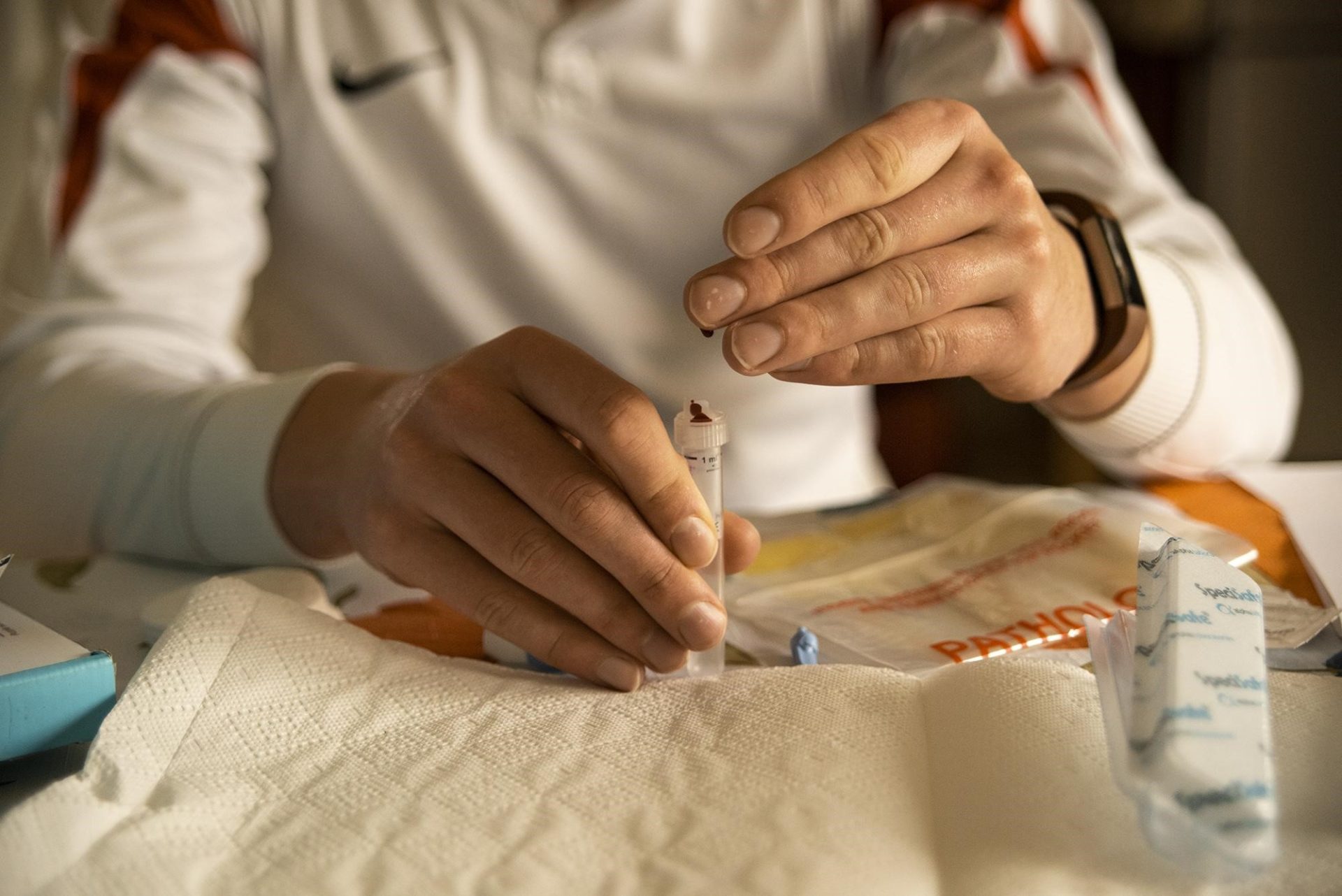
LetsGetChecked offers more specific tests; meanwhile, LiveSmart offers blood test bundles. The great thing about these platforms is that they offer actionable insights and break down the data you get in a way that makes sense, which often isn’t the case when you visit a doctor.
10. They Take the Right Supplements and Take Care of Their Diet
There’s a lot of “supplements are bad” content on the internet.
The truth? Most people, in fact, don’t need them.
But when you are at a point where you are putting your body through high intensity every day, what you consume in most cases isn’t going to be enough for maximum recovery and muscle maintenance.

What do most athletes need to take?
Vitamin D. Around 1 billion people worldwide have vitamin D deficiency, and that just says it all. Most of us need more Vitamin D, but athletes, especially. Right amounts of vitamin D allow for better strength and performance, and vice versa. If you are missing any other vitamins, it’s also important that you take care of them.
Protein. Most people can get enough protein through their diet. That’s not the case with athletes that train at high intensity. Not only is protein needed to repair broken down muscle tissue, but it gives you more energy by allowing you to use your carbs much better during game time.
Whatever your blood tests show that you are missing. This will ultimately make the biggest difference. If you are missing something in your body, your body isn’t going to work correctly. And that’s a big disadvantage.
Before you buy anything, it’s important to do your research to see how much of what you are planning to buy you are getting with your current food, but also around how much you need for your body.
These Are the 10 Healthy Habits of Football Players
There’s a lot of different types of football players out there, and not all follow these healthy habits of football players. The ones that do? They are the top performers. Even when they get older. There’s a reason why Messi and Ronaldo are still on top at their age when other greats were many levels below them at the age of over 30.
And if you found this in-depth post about the top 10 health habits of football players useful and are working on trying to become a better football, you will find our other content incredibly useful too.
Michael Smolski
